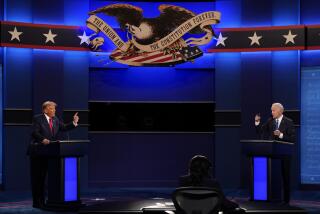John Edwards, You’re No Tom Cruise
- Share via
WASHINGTON — All Kelly Ripa had to do was suggest that Sen. John Edwards, her guest on Thursday’s “Live With Regis & Kelly,” get Tom Cruise to play him if there were a movie version of campaign 2004. From there, Edwards ran with it.
Tuesday’s vice presidential debate, Edwards suggested, was a replay of the courtroom scene from the 1992 film “A Few Good Men.” Edwards was the young, handsome, idealistic Lt. Daniel Kaffee, played by Cruise. That left Vice President Dick Cheney in the Jack Nicholson role of the villainous Marine Col. Nathan R. Jessup defending his extremism in the name of national security.
Edwards even acted out the scene. “Cheney (saying), ‘You need me on that wall! You need me on that wall!’ ”
The audience laughed. “And me saying, ‘You can’t handle the truth!’ ”
Overlooking the fact that Nicholson’s character actually says both lines, Edwards was only embracing what has become an American ritual. Political analysts and entertainers constantly struggle to come up with such pop-culture metaphors for politicians -- and some have proved quite resilient. Jackie Kennedy could not have known how long the musical “Camelot” would stand for the “brief shining moment” of John F. Kennedy’s presidency when, a week after his assassination, she urged journalist Theodore White to quote one of the show’s tunes for a Life magazine epilogue. Such metaphors can also be wielded as a shiv; decades after then-Vice President Richard Nixon tarred 1956 Democratic presidential candidate Adlai Stevenson as an “indecisive
“A Few Good Men” is hardly the first film to be revived in this election cycle. Conservatives giggled when, just in time for both the presidential debates and the “Star Wars” trilogy DVD release, some began comparing Sen. John Kerry to C-3PO. Kerry defenders don’t see any similarity between the decorated Vietnam War veteran and George Lucas’ gold droid -- a multilingual, hand-wringing, fey Cassandra who advocates surrender.
Who’s President Bush in this conservative universe? Swash-buckling Han Solo, who even says “Bring ‘em on” when fighting the Death Star, though that sentiment was assuredly better received in 1977.
Perhaps even some Kerry advocates might find it amusing to consider the debate over prospects in Iraq through the lens of “Star Wars.” Particularly if -- as the conservative bloggers who first came up with the idea -- one doesn’t have a tough time transposing the president’s head onto Solo’s body.
“Sir,” C-3P0 says to Solo in one scene, “the possibility of successfully navigating an asteroid field is approximately 3,720 to 1.”
“Never tell me the odds!” retorts Solo.
In its purest form, the idea of the exercise is to find a preexisting dynamic that sums up both candidates’ strengths and weaknesses through the dramas we find more understandable and entertaining. In that vein, it has been suggested that R2-D2 is a better stand-in for the president -- still on the side of the good guys, but shorter and sometimes difficult to understand.
Such metaphors work as lofty ways to insult a candidate. Conservative columnist Charles Krauthammer sees in Kerry too much of vain chess master Efim Bogoljubov, who said, “When I am White, I win because I am White” (White has the advantage of moving first.); “When I am Black, I win because I am Bogoljubov.”
Far more accessible than the Bogoljubov metaphor are the comparisons between baseball teams and political parties, with the wealthy, winning Yankees mirroring the GOP, while Kerry’s Boston Red Sox, most famous for choking, are Democrats.
The Bush-Kerry pop culture debate can take on the Shakespearean erudition from Stevenson’s time. At www.shaksper.net, which bills itself as the global electronic conference for the Bard, it is a given that Kerry is the conflicted, discursive Hamlet; the great debate deals with whether Bush is Prince Hal from “Henry IV,” emerging from his wasted tavern days to grow into a respected monarch, or Hamlet’s impulsive but more assured Laertes.
But Edwards’ contribution to the exercise is worth a second look. Americans are being asked to reelect a leader whose team, like Col. Jessup’s, has been accused of cover-ups and excessive force in the name of national security. But it remains to be seen whether Americans wouldn’t prefer the zealous Jessup over the more dovish Kaffee to guard their families in the post-9/11 world.
More to Read
Get the L.A. Times Politics newsletter
Deeply reported insights into legislation, politics and policy from Sacramento, Washington and beyond. In your inbox twice per week.
You may occasionally receive promotional content from the Los Angeles Times.










